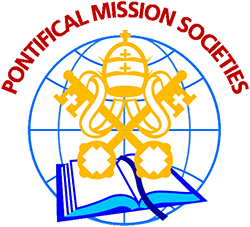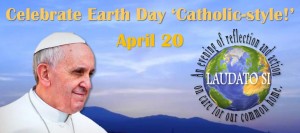 Laudato Si: On Care for Our Common Home from Pope Francis, addressed to “every person living on this planet,” is an inclusive dialogue about how we are shaping the future of our planet. Pope Francis calls the Church and the world to acknowledge the urgency of our environmental challenges and to join him in embarking on a new path. This encyclical is written with both hope and resolve, looking to our common future with candor and humility. Laudato Si invites us to reclaim our Catholic Mission to care for God’s created world and the dignity of the human life created in the image of God. The Pontifical Mission Societies help local churches bringing the Gospel to those on the margins of human society respond to natural disasters and promote the dignity of poor people trying to build sustainable futures for their families. These Churches, located in 1,111 Mission Dioceses, are located in Africa, Asia, the Pacific Islands, remote regions of South America, and formerly Communist countries in Europe, the parts of the world most significantly impacted by climate change.
Laudato Si: On Care for Our Common Home from Pope Francis, addressed to “every person living on this planet,” is an inclusive dialogue about how we are shaping the future of our planet. Pope Francis calls the Church and the world to acknowledge the urgency of our environmental challenges and to join him in embarking on a new path. This encyclical is written with both hope and resolve, looking to our common future with candor and humility. Laudato Si invites us to reclaim our Catholic Mission to care for God’s created world and the dignity of the human life created in the image of God. The Pontifical Mission Societies help local churches bringing the Gospel to those on the margins of human society respond to natural disasters and promote the dignity of poor people trying to build sustainable futures for their families. These Churches, located in 1,111 Mission Dioceses, are located in Africa, Asia, the Pacific Islands, remote regions of South America, and formerly Communist countries in Europe, the parts of the world most significantly impacted by climate change.
Learn about Church Teaching & How Climate Change Affects Families in the Missions
“We need to strengthen the conviction that we are one single human family. There are no frontiers or barriers, political or social, behind which we can hide, still less is there room for the globalization of indifference.” Pope Francis, Laudato Si, #52
Agenzia Fides, the information service of the Pontifical Mission Societies, offers daily news from the Church around the world on their website www.fides.org/en and through a free email subscription. The Fides archives are searchable by country and by topic, for example, water, environment, etc. making this website a terrific resource.
Invite a Missionary speaker to our parish to learn first- hand the challenges and joys of the local churches in Mission Dioceses. There is no fee to schedule a speaker through the Archdiocesan Pontifical Mission Societies office; however, we do ask that your parish respond by inviting participants to make a sacrificial offering to be distributed to dioceses around the world. More information and scheduling forms here.
Find out more updates on Missions by signing up here
Pray in Solidarity with our Brothers & Sisters around the World
“Living our vocation to be protectors of God’s handiwork is essential to a life of virtue; it is not an optional or a secondary aspect of our Christian experience.” Pope Francis, Laudato Si, #217
Pray the World Mission Rosary and for Missionaries working in the countries most affected by climate change. Click here for prayer resources, including the World Mission Rosary prayer intentions.
Act in Solidarity
You can make a difference. Here are some examples of how the Pontifical Mission Societies in Mission Dioceses are collaborating addressing to Pope Francis’ challenge to environmental issues:
Straight from Laudato Si to the Missions
Water
Excerpt from Laudato Si #29: “One particularly serious problem is the quality of water available to the poor. Every day, unsafe water results in many deaths and the spread of water-related diseases, including those caused by microorganisms and chemical substances. Dysentery and cholera, linked to inadequate hygiene and water supplies, are a significant cause of suffering and of infant mortality. Underground water sources in many places are threatened by the pollution produced in certain mining, farming and industrial activities, especially in countries lacking adequate regulation or controls. It is not only a question of industrial waste. Detergents and chemical products, commonly used in many places of the world, continue to pour into our rivers, lakes and seas.”
PRACTICE Laudato Si AT HOME:
Here are simple ways that YOU can Save Water Inside and Outside your Home Simple Ways to Save Water
Responses in Mission Lands:
The Poloni Home for Orphans in the Diocese of Kondoa, Tanzania, received $10,000 from the Missionary Childhood Association to provide clean water. A typical day for the orphans begins with waking at 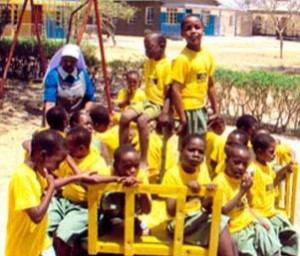 6 am, followed by washing, dressing and breakfast. They attend school from 8 am to 12.30 pm. Then there is a break for lunch and a siesta in the heat of the day. Afterwards there are chores. Depending on the age and ability of the child, that might involve cleaning or gardening, feeding chickens or helping with washing. Like most orphanages feeding the children is a major expense so the property has poultry, a small dairy and a market garden. The rest of the afternoon is taken up with playing sport or entertainment. This is followed by personal cleaning, showering, prayers, dinner, home work or study, and bedtime by 9 pm!
6 am, followed by washing, dressing and breakfast. They attend school from 8 am to 12.30 pm. Then there is a break for lunch and a siesta in the heat of the day. Afterwards there are chores. Depending on the age and ability of the child, that might involve cleaning or gardening, feeding chickens or helping with washing. Like most orphanages feeding the children is a major expense so the property has poultry, a small dairy and a market garden. The rest of the afternoon is taken up with playing sport or entertainment. This is followed by personal cleaning, showering, prayers, dinner, home work or study, and bedtime by 9 pm!
Solar
Excerpt from Laudato Si #172: “For poor countries, the priorities must be to eliminate extreme poverty and to promote the social development of their people. There is a need to acknowledge the level of consumption in some sectors of their population. They are likewise bound to develop less polluting forms of energy production, but to do so they require the help of other countries. Taking advantage of abundant solar energy will require the establishment of mechanisms and subsidies which allow developing countries access to technology and financial resources.”
Responses in Mission Lands:
- Your donations to the Pontifical Mission Societies provided $15,000 to the Monrovia Archdiocese in Liberia for the purchase
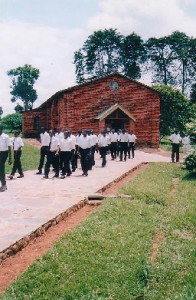 of solar panels and installation in two rural parishes.
of solar panels and installation in two rural parishes. - $8,000 was provided for the installation of a solar system at St. Mary’s Rubya Minor Seminary in Bukoba Diocese, Tanzania and $2,000 was donated to the neighboring Tanzanian Diocese of Mbeya for a solor system for the new parish of Butonga.
- Donations to the Societies has also made a difference in Uganda with almost $10,000 in finances to install solar lighting systems at the Holy Family Bukalasa Minor Seminary in Masaka and at the St. Kizito Minor Seminary in Nandere.
Food
Excerpt from Laudato Si #50: “we know that approximately a third of all food produced is discarded”
From Pope Francis, General Audience of June 5, 2013: “Let us remember well, however, that whenever food is thrown out it is as if it were stolen from the table of the poor, from the hungry! I ask everyone to reflect on the problem of the loss and waste of food, to identify ways and approaches which, by seriously dealing with this problem, convey solidarity and sharing with the underprivileged.”
Responses from Mission Lands:
There are almost 10,000 orphanages and more than 1,200 school programs supported by donations to the Missionary Childhood Association, one of the Pontifical Mission Societies. The support for Food programs can be found from Aguarico, Ecuador to Virac, Philippines and from Benin, Africa to Wabang, Papua New Guinea. A few examples are listed below:
- $6,000 provides food supplies to the Mporokoso School for the Blind in the Archdiocese of Kasama, Zambia while an additional $6,000 is given to the St. Joseph the Worker Small Home is the Kakamega Diocese in the African country of Kenya.
- In the same country of Kenya, $5,000 feed many at the Matiya parish in the Zomba diocese.
- Food and medicine totaling over $14,000 for the year is provided to poor children in the Diocese of Balasore, India and $5,000 helps children in the Patriarch Alessandria Dei Copti in Egypt.
In the Archdiocese of Lusaka in Zambia, $4,000 is given for health care 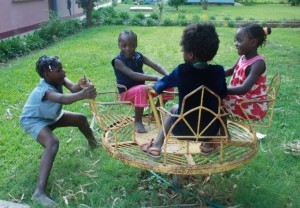 and nutrition to the Nyumba Yanga Orphanage, which is one of several projects which were created to help relieve the suffering of children orphaned by HIV/AIDS. It provides care for the most vulnerable group of children; girls who have lost both parents. Zambia is a country which is severely afflicted by the HIV/AIDS pandemic where an estimated one million children are affected and orphaned by the disease.
and nutrition to the Nyumba Yanga Orphanage, which is one of several projects which were created to help relieve the suffering of children orphaned by HIV/AIDS. It provides care for the most vulnerable group of children; girls who have lost both parents. Zambia is a country which is severely afflicted by the HIV/AIDS pandemic where an estimated one million children are affected and orphaned by the disease.
The orphans attend private schools as their traumatic past requires a more attentive school atmosphere than the governmental schools can offer, and these schools also offer a higher quality education. Private schools offer 30 students per teacher, compared to 60 or more in most government schools.
The orphanage also gives the girls training in various income-generating activities, such as rabbit and chicken rearing, gardening, rosary beading and painting. These activities provide the girls with more nutritive balanced diets and practical skills, while also providing much needed income for the home itself. For instance, the sale of surplus chicken approximately covers electricity bills for the orphanage.
